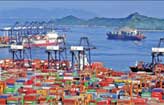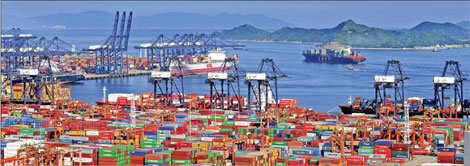Blue economy gets a lift
Updated: 2011-08-19 14:29
(China Daily European Weekly)
|
|
Coastal areas of Shandong, Zhejiang and Guangdong to spearhead sector development
The oceans have often played an important role in shaping the history and charting the destiny of nations. But in modern times the oceans have taken on a different hue with a strong blue (marine) economy holding the promise of steady and sustained economic growth.
China, despite its vast huge coastal resources, has never been able to gain significant economic advantage from them due to its heavy reliance on land resources. Realizing the importance, China has decided to boost its marine economy in the 12th Five-Year Plan (2011-15).
The marine economy has till recently included sectors like shipping, fishing, aquaculture and oil and gas. However, in recent times the definition has been widened to include other sectors like marine chemistry, biomedicine, ocean power, seawater use, ocean engineering and construction, and marine tourism.
There is no doubt that China possesses abundant marine resources along its 3 million sq km of offshore waters and 32,000 kilometers of coastline. The nation has proven marine oil reserves of around 24.6 billion tons and natural gas reserves of over 1.6 billion cubic meters.
"China has recognized that it needs to turn to the oceans for further development of its economy," says Michael O'Toole, program manager of Sea Change Management at the Marine Institute of Ireland. O'Toole has a long history of working in China and has worked with the Yellow Sea Fisheries Research Institute in Qingdao for over 15 years on a United Nations Development Program project.
"The oceans are strategically important to China. Its future
|
 |
As part of its plans to boost the marine economy, the government has decided to set up pilot economic zones in the coastal provinces of Shandong, Zhejiang and Guangdong.
The Shandong Peninsula Blue Economic Zone was the first area to be brought under the government's marine economy agenda, followed by Zhejiang and most recently Guangdong.
That the marine economy has immense potential can be gauged from the available data that indicate the oceanic sector in China recorded annual growth rates of over 13 percent to reach 3.8 trillion yuan (353 billion euros) in 2010.
By current estimates, the marine economy accounts for around 10 percent of China's total gross domestic product (GDP), and is poised for further growth, says Han Limin, a marine economy professor at the Ocean University of China in Qingdao.
"China still has a long way to go compared with Western countries in boosting its marine economy, especially in areas which demand cutting-edge technology and high-end machinery," Han says.
O'Toole, however, feels that unless environmental challenges are handled properly, China will continue to lag its Western counterparts in the marine economy.
That statement finds credence in the fact that most of the coastal waters in China are heavily polluted, with the pollutants often triggering harmful algal blooms that stifle the marine ecosystem.
"If China has to take full advantage of the oceans as a source of food, energy and minerals for its people, it also needs to develop a new policy for its marine sector," Han says.
Shandong province
For a province which has a rich history and a long tradition in maritime development, China's decision to spur its blue economy does not come as a surprise.
E-paper

Blue economy gets a lift
Coastal areas of Shandong, Zhejiang and Guangdong to spearhead sector development.
The light touch
Long way to go
Outdoor success
Specials

Star journalist remembered
Friends, colleagues attended a memorial service to pay tribute to veteran reporter Li Xing in US.

Robots seen as employer-friendly
Robots are not new to industrial manufacturing. They have been in use since the 1960s.

A prosperous future
Wedding website hopes to lure chinese couples

